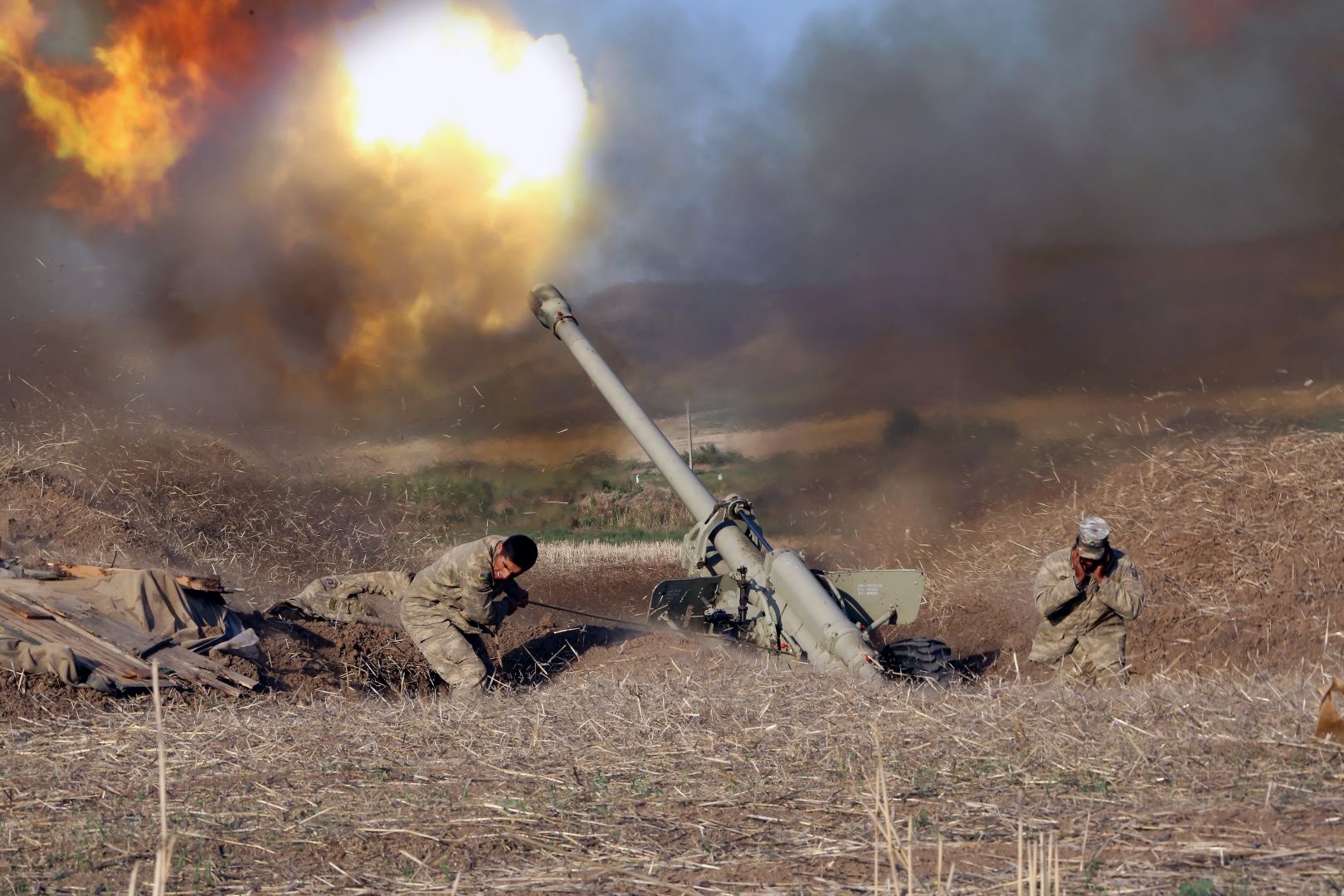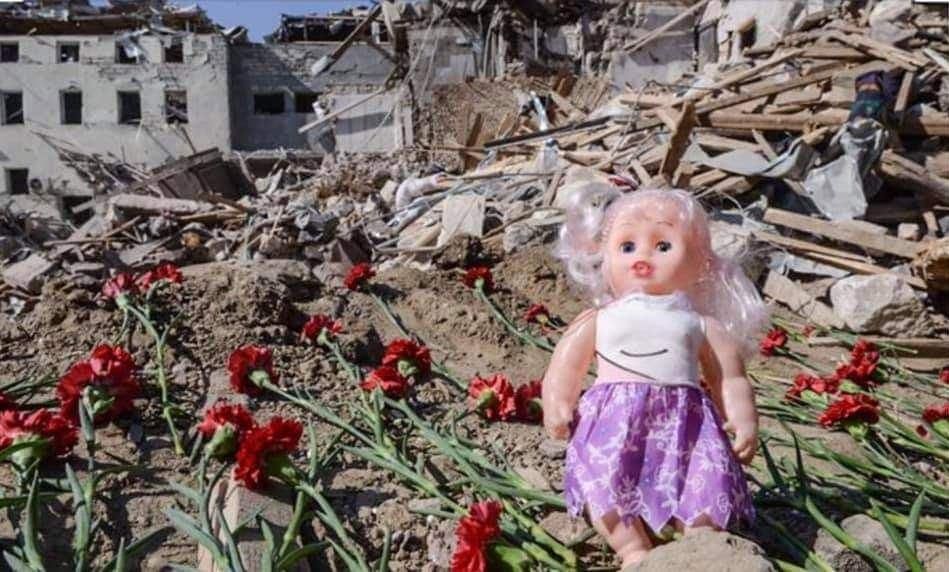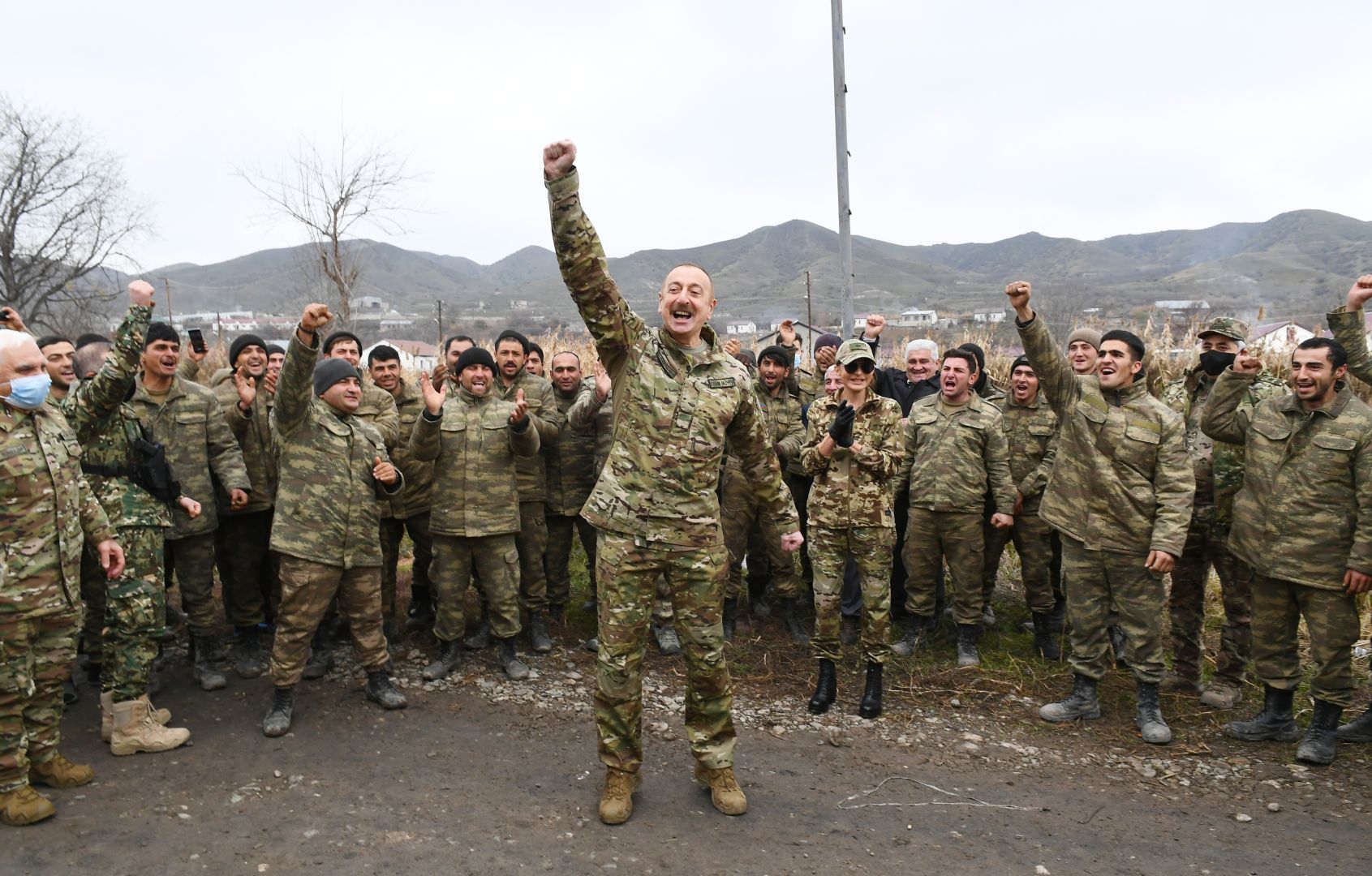|
|
TODAY.AZ / Analytics
Commemorating memory of Martyrs - 4 years since September 27 counter-offensive operation
27 September 2024 [00:01] - TODAY.AZ

By AzerNEWS
September 27, 2020, is one of the most important days in the history of the national heroism of Azerbaijan. That day, the Armed Forces of the Republic of Azerbaijan began responsive measures to counter another military provocation from the Armed Forces of the Republic of Armenia.
How did the counter-offensive start?
After the Republic of Azerbaijan regained its independence for the second time in the early 1990s, its territories were subjected to Armenian occupation. Armenia, which has been eyeing the territories of Azerbaijan from time to time, took advantage of the collapse of the Soviet empire and began to invade the Garabagh region of Azerbaijan and then the surrounding regions. For 30 years, Armenia illegally settled in Garabagh, ignoring 4 UN resolutions on Azerbaijan's territorial integrity, and carried out terror and genocide against the peaceful population of Azerbaijan.
The years 1991, 1992, and 1993 were consecutively marked as the year of invasion and tragedies in the history of Azerbaijan. During the First Garabagh War in 1991-1994, Azerbaijan gave nearly 12 thousand martyrs, and in the end, more than 20 percent of the territories were occupied by Armenian military units.
After the ceasefire agreement reached with Armenia at the initiative of National Leader Heydar Aliyev in 1994, Azerbaijan appealed to international institutions and organizations. At that time, Armenia was protected by both Russia and Western organizations, and, taking advantage of this opportunity, Yerevan tried to legitimize the occupation of Garabagh and other Azerbaijani territories. Many organizations tried to freeze the Garabagh conflict in favour of Armenia and always stood by Armenia on the issue of the conflict.

Finally, in 2020, Armenia continued its 30-year-old mood of invasion and launched provocative attacks against Azerbaijan. After a long ceasefire, the Armenian side against Azerbaijan initiated the first offensive in July. In order to advance further, Armenia started firing towards some of Azerbaijan's former contact lines, and as a result, on September 27, the Azerbaijani army launched a counter-offensive operation.
The self-defence operation initiated by Azerbaijan was written down in history as the Patriotic War
2908 military servicemen of the Azerbaijani Armed Forces were martyred, and 6 are considered missing in the Patriotic War.
Unable to withstand the triumphant march of the Azerbaijani Army, the enemy resorted to provocations and committed war crimes by targeting innocent civilians.

The second largest city of Azerbaijan, ancient Ganja with numerous historical and cultural monuments, Mingachevir (Water Power Station) and Yevlakh (Baku-Tbilisi-Ceyhan oil pipeline), where strategic facilities are located, Beylagan, Barda, Tartar, Gabala, Goranboy, Agjabedi, Absheron, Khizi, and other regions were fired from ballistic missiles and other heavy artillery devices.
On September 27, 2020, as a result of the fall of a cannon shell on the house of Elbrus Gurbanov, in Gashalti-Garagoyunlu village of Naftalan city, a family - of 5 people was completely destroyed.
On October 4, 5. 8, 11, and 17, as a result of missiles and heavy artillery, 26 people died, 175 people were injured in the city of Ganja, and civil infrastructure facilities and vehicles in the city were heavily damaged.
As a result of missile and heavy artillery attacks by Armenian armed forces, 29 people died, 112 people were injured in the Barda region, and civilian infrastructure facilities and vehicles in the region were heavily damaged.
Totally, as a result of Armenia’s military aggression, 93 civilians were killed, including 12 children and 27 women, 454 civilians were injured, 12 292 residential and non-residential settlements in total, 288 vehicles were damaged, and 1,018 farms were found to be damaged.
In the period from September 27 to November 10, 2020, Armenia shelled Tartar, Agjabedi, and Goranboy districts, located both on the battlefield and outside the conflict zone, using prohibited and extremely dangerous phosphorus bombs 5 times at different times.
On October 8, November 3, 4, and 8, the armed forces of Armenia in the occupied territories of the Republic of Azerbaijan, as well as the persons leading the military units located in the territory of the Republic of Armenia and the criminal organizations created by them, grossly violating the requirements of Geneva Convention, dated 1949, on the protection of civilians during armed conflicts, using war methods leading to large scale destructions, to cause extensive, long-lasting and serious damage to the settlements located in the territories of Fuzuli and Tartar districts, where the civilian population or individual civilians who did not participate in the hostilities live, as well as to the environment in violation of the basic principles of the UN Convention on Biological Diversity, containing 3.6 kilograms of P-4 chemical composition (white phosphorus) in each of the forests with valuable and perennial trees, which are considered a natural resource of the Republic of Azerbaijan, located in the territory of the city of Shusha, situated in the village of Arayatli, Alkhanli, Tartar district of Fuzuli district in order to intentionally kill people. By firing at least 6 D-4-type 122-millimeter cannon shells and deliberately burning the natural resources located in those areas, Armenians caused a large amount of damage, planned and carried out an aggressive war against Azerbaijan, and committed terrors and heavy crime.

Despite all of these, the Azerbaijani Army, under the leadership of Supreme Commander-in-Chief Ilham Aliyev, liberated its lands from the occupation in 44 days of the “Iron Fist” operation, and the territorial integrity of our country was ensured.
We commemorate with deep respect and esteem the memory of all our Martyrs who died for the independence, sovereignty, and territorial integrity of Azerbaijan on September 27, which is celebrated as the Commemoration Day in our country by order of the President of the Republic of Azerbaijan.
URL: http://www.today.az/news/analytics/253397.html
 Print version
Print version
Connect with us. Get latest news and updates.
See Also
- 07 November 2024 [20:45]
From press to politics or sympathy to hatred: Gallup's downbeat survey on Pashinyan's rating - 01 November 2024 [11:05]
Sustainable development is one of goals of COP29 - 31 October 2024 [13:50]
New trains, green lanes: Azerbaijan's journey to COP29 readiness - 28 October 2024 [17:10]
Lukewarm wishes from Yerevan - How sincere is Pashinyan in congratulating his Georgian counterpart? - 25 October 2024 [09:00]
Azerbaijan expands IFC partnership to enhance energy efficiency and sustainable development - 24 October 2024 [16:54]
Georgia under Western pressure - 23 October 2024 [13:28]
Azerbaijan becomes leader of Central Asia-Europe energy corridor - 23 October 2024 [08:30]
SOCAR's sustainable initiatives ahead of COP29: Paving way for carbon-neutral future - 22 October 2024 [19:57]
Islamophobia in France – Policy continuing since 20th century - 22 October 2024 [08:30]
Azerbaijan makes headway with loan projects boosting reconstruction in liberated areas
Most Popular
 Yerevan fails to recognize the importance of listening to Azerbaijan
Yerevan fails to recognize the importance of listening to Azerbaijan
 Dashnaks Influencing the European Parliament and Threatening EU Leadership
Dashnaks Influencing the European Parliament and Threatening EU Leadership
 Armenia sends resumed package of peace proposals to Azerbaijan
Armenia sends resumed package of peace proposals to Azerbaijan
 Donald Trump's victory, Macron's hypocrisy and President Ilham Aliyev's indisputable arguments
Donald Trump's victory, Macron's hypocrisy and President Ilham Aliyev's indisputable arguments
 Europe slammed its doors on Armenia
Europe slammed its doors on Armenia
 “Chinghiz Aitmatov” Order bestowed upon President Ilham Aliyev in Bishkek [PHOTOS]
“Chinghiz Aitmatov” Order bestowed upon President Ilham Aliyev in Bishkek [PHOTOS]
 Azerbaijani carpet expert awarded in South Korea
Azerbaijani carpet expert awarded in South Korea
